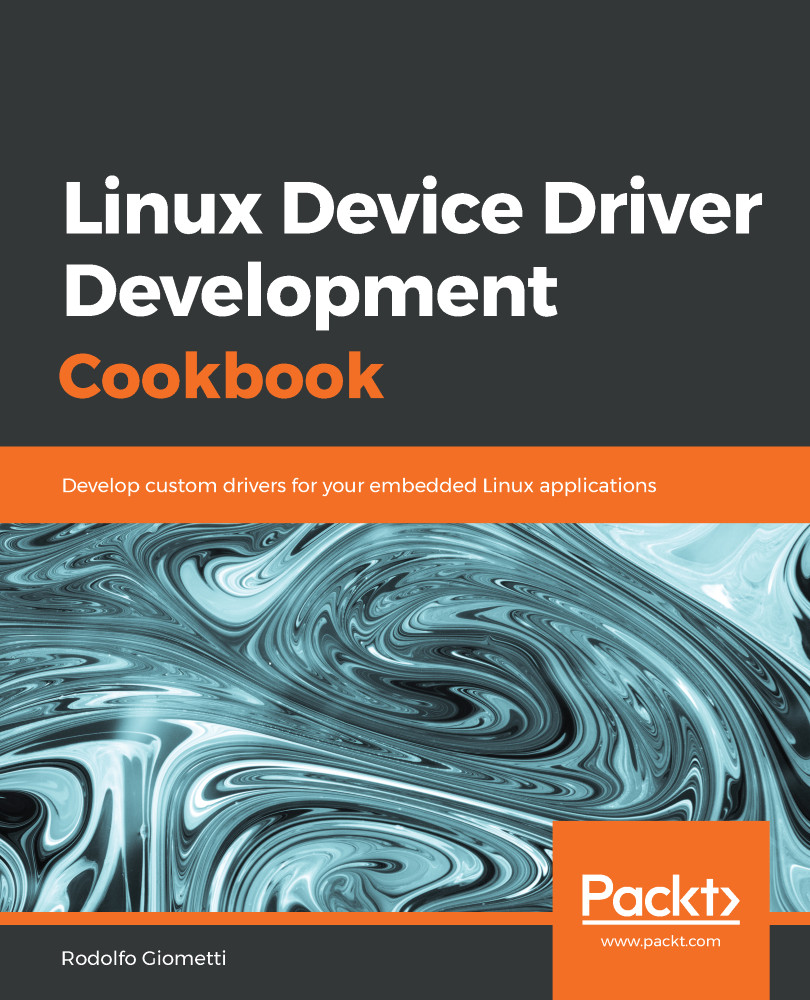As already stated (and as any real programmer of embedded devices knows), the serial console is a must-have during the device drivers development stages! So, let's see how we can get access to our ESPRESSObin through its serial console.
Working with the serial console
Getting ready
As shown in the screenshot in the Technical requirements section, a micro USB connector is available and it's directly connected with ESPRESSObin's serial console. So, using a proper USB cable, we can connect it to our host PC.
If all connections are OK, we can execute any serial Terminal emulator to see data from the serial console. Regarding this tool, I have to state that, as editor program, we can use whatever we prefer. However, I'm going to show how to install two of the more used Terminal emulation programs—minicom and screen.
To install minicom, use the following command:
$ sudo apt install minicom
Now, to install the Terminal emulator named screen, we just have to replace minicom string with the screen packet name, as shown in the following:
$ sudo apt install screen
Both of them need a serial port to work on and the invocation command is quite similar. For brevity, I'm going to report their usage to get connected with the ESPRESSObin only; however, for further information about them, you should refer to their man pages (use man minicom and man screen to show them).
How to do it...
To test the serial connection with our target system we can do the following steps:
- First of all, we have to locate the right serial port. Since the ESPRESSObin uses an USB emulated serial port (at 115,200 baud rate), usually our target port is named ttyUSB0 (but your mileage may vary, so let's verify it before continuing) so the minicom command we have to use to get connected with the ESPRESSObin serial console is the following:
$ minicom -o -D /dev/ttyUSB0
$ cat /dev/ttyUSB0
cat: /dev/ttyUSB0: Permission denied
In this case, the cat command perfectly tells us what's wrong so we can fix this issue using sudo or, even better, by properly adding our system's user to the right group as shown here:
$ ls -l /dev/ttyUSB0
crw-rw---- 1 root dialout 188, 0 Jan 12 23:06 /dev /ttyUSB0
$ sudo adduser $LOGNAME dialout
Then, we log out and log in again, and we can access the serial devices without any problem.
- The equivalent command by using screen is reported as follows:
$ screen /dev/ttyUSB0 115200
- If everything works well, after executing your Terminal emulator on the right serial port, turn on our ESPRESSObin (simply by plugging in the power). We should see the following output on our Terminal:
NOTICE: Booting Trusted Firmware
NOTICE: BL1: v1.3(release):armada-17.06.2:a37c108
NOTICE: BL1: Built : 14:31:03, Jul 5 2NOTICE: BL2: v1.3(release):armada-17.06.2:a37c108
NOTICE: BL2: Built : 14:31:04, Jul 5 201NOTICE: BL31: v1.3(release):armada-17.06.2:a37c108
NOTICE: BL31:
U-Boot 2017.03-armada-17.06.3-ga33ecb8 (Jul 05 2017 - 14:30:47 +0800)
Model: Marvell Armada 3720 Community Board ESPRESSOBin
CPU @ 1000 [MHz]
L2 @ 800 [MHz]
TClock @ 200 [MHz]
DDR @ 800 [MHz]
DRAM: 2 GiB
U-Boot DComphy-0: USB3 5 Gbps
Comphy-1: PEX0 2.5 Gbps
Comphy-2: SATA0 6 Gbps
SATA link 0 timeout.
AHCI 0001.0300 32 slots 1 ports 6 Gbps 0x1 impl SATA mode
flags: ncq led only pmp fbss pio slum part sxs
PCIE-0: Link down
MMC: sdhci@d0000: 0
SF: Detected w25q32dw with page size 256 Bytes, erase size 4 KiB, total 4 MiB
Net: eth0: neta@30000 [PRIME]
Hit any key to stop autoboot: 2
See also
- For more information about how to get connected with the ESPRESSObin serial port, you can take a look at its wiki section about serial connections at http://wiki.espressobin.net/tiki-index.php?page=Serial+connection+-+Linux.





































































